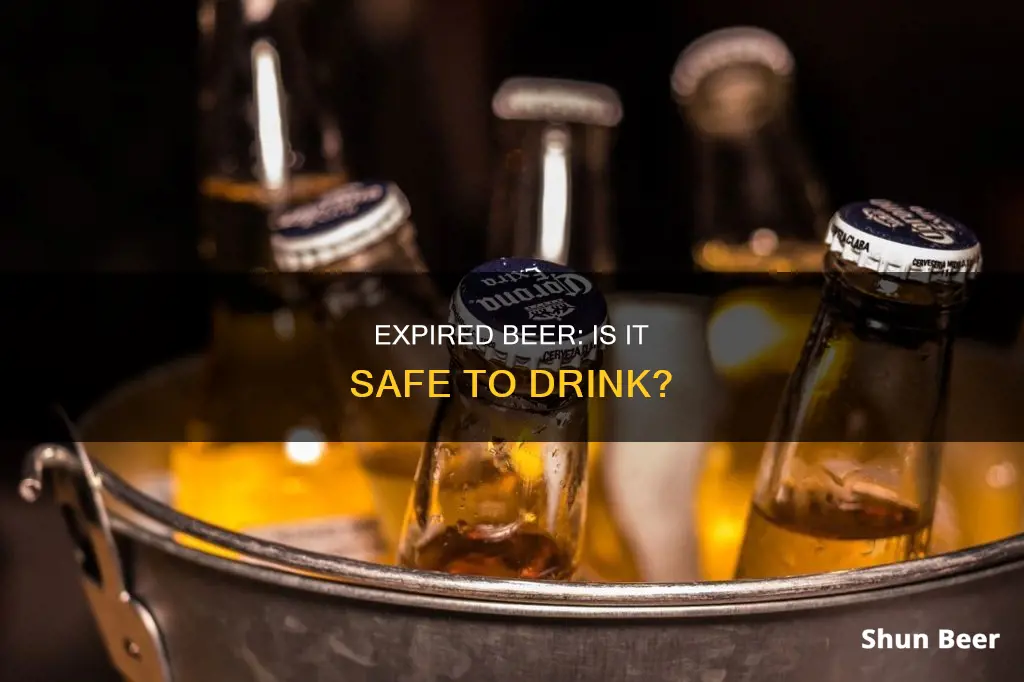
We've all been there: you find a can of beer tucked away in the back of the fridge, only to realize it's past its expiration date. But is it safe to drink? The short answer is yes—drinking expired beer is unlikely to make you sick. Beer doesn't expire in the same way that other foods do, and the alcohol content and presence of hops, which have antimicrobial properties, prevent pathogenic growth. However, the taste of the beer may be affected, and it's important to check for signs that the beer has gone bad, such as a loss of fizz or a vinegary taste.
| Characteristics | Values |
|---|---|
| Is it safe to drink expired beer? | In almost all cases, yes. |
| Will drinking expired beer make you sick? | No, it won't make you sick. |
| Will drinking expired beer hurt you? | No, it won't hurt you. |
| What happens if you drink expired beer? | It might taste bad, but it won't make you sick. |
| What causes beer to expire? | Light, oxygen, heat, and time. |
| How long does beer last beyond its expiration date? | At room temperature, 5 to 9 months. In a refrigerator, up to 2 to 3 years. |
| Does unopened beer go bad? | Yes, unopened beer will eventually go bad. |
| Does opened beer go bad? | Yes, opened beer will go bad in about a day. |
| Does canned beer go bad? | Yes, canned beer goes bad, but usually more slowly than bottled beer. |
| Does bottled beer go bad? | Yes, both dark and light bottles will go bad over time. |
| Does beer need to be refrigerated? | Yes, it's best to store beer in a refrigerator. |
What You'll Learn

Is drinking expired beer bad for your health?
Drinking an expired beer is not bad for your health. It won't make you sick or hurt you in any way. However, the taste of the beer will change over time, and it may not be a pleasant drinking experience. The fermentation process used in brewing, as well as the low pH level and alcohol content, make it difficult for bacteria to grow and cause sickness.
That being said, there are a few things to keep in mind when it comes to expired beer:
- If the beer has lost its fizz, it's a sign that the seal was broken and the beer is no longer fresh.
- If a beer develops a vinegary taste, it's an indication that bacteria have gotten in, and it should be discarded.
- Heat speeds up the oxidation process, so storing beer at room temperature or in a hot environment can cause it to go stale more quickly.
- Light, especially UV light, can cause a chemical reaction in the hops, resulting in a skunky flavour. Therefore, it's best to store beer in a cool, dark place, preferably in a refrigerator.
- Some types of beer, such as IPAs, are best consumed fresh, as the hoppy aromas and flavours can fade or change over time.
In summary, while drinking expired beer is not harmful to your health, it may not taste as good as a fresh beer, and proper storage conditions are important to maintain the quality of the beer.
Temporary Crowns and Beer: What You Need to Know
You may want to see also

What are the factors that cause beer to expire?
Beer is made from organic plant ingredients that eventually decay. While it doesn't spoil in the same way as perishable foods, it does have a shelf life and can go bad. There are several factors that cause beer to expire:
Oxygen
When beer comes into contact with oxygen during the brewing process, packaging, or storage, it oxidises. This means that the oxygen reacts with the beer's chemical makeup, breaking down hop oils and other flavour compounds. This results in a cardboard-like or stale taste, a reduced aroma, and discolouration.
UV Light
Beer, especially those in clear or green bottles, can become "skunky" when exposed to UV light. This is due to a photochemical reaction between UV light and hop compounds in the beer, which produces a compound that smells like a skunk.
Microbial Contamination
Commercial beers are well-pasteurised and filtered. However, improper brewing practices, packaging errors, or poor storage conditions can lead to bacterial contamination. Unintended wild yeast infestations can also contaminate beer, especially in home brews or improperly sealed commercial brews. This can result in a sour, musty, or metallic taste, and a cloudy appearance or unexpected sediment.
Temperature Fluctuations
High temperatures accelerate chemical reactions, which break down flavour compounds. On the other hand, freezing can cause the beer to expand, potentially breaking the container and introducing oxygen upon thawing. This can lead to stale or cooked flavours, and flat or overly fizzy beer.
Aging
Over time, all beer will undergo chemical changes that alter its flavour, aroma, and mouthfeel. Aging causes the aromas and hop flavours to mellow, while the malt flavour becomes stronger. This can be desirable for some people, but for others, it can mean a loss of the beer's intended profile.
Drinking and Driving: Two Beers, Am I Safe?
You may want to see also

How do you know if a beer has expired?
Firstly, it's important to note that beer expiration is different from food expiration. Beer doesn't expire in the same way that food expires. While old food can cause pathogenic bacterial growth that can make humans sick, the alcohol content in beer and the presence of hops (which have antimicrobial characteristics) prevent this from happening. Neil Witte, a Master Cicerone, explains that "the worst thing that's going to happen to beer when it gets old is that it's going to taste bad."
However, there are still ways to tell if a beer has gone bad. Firstly, check the expiration date on the packaging. If the beer is past this date, it may have gone bad. Secondly, look at the colour of the bottle or can. Clear or green bottles are more susceptible to light exposure, which can cause the beer to become "skunky" and oxidise rapidly. Brown bottles offer better protection against UV light, while cans completely shield beer from light.
If you're still unsure, you can look out for other signs that a beer has gone bad. These include a change in colour, smell, taste, foam density, and overall appearance. If a beer is only slightly past its expiration date, it may be hard to tell. However, when a beer has truly gone bad, you'll likely notice something is off before you even take a sip.
Finally, it's worth noting that different styles of beer have different shelf lives. For example, IPAs are best enjoyed as fresh as possible, while heavier beers like stouts and porters can last longer, even up to a couple of years in the cellar.
Beer Expiration: Safe to Drink After Expiry?
You may want to see also

How can you store beer to extend its shelf life?
To extend the shelf life of beer, it is important to consider the three major factors that affect the quality and lifespan of beer: light, air, and temperature.
Light
Sunlight and artificial light can break down the molecules in beer, affecting its colour and taste over time. Beer should be stored in a cool, dark place, away from direct sunlight and heat sources. Beer bottles should be made of dark-coloured glass, such as amber or green, to offer better protection from light. However, cans are the superior choice for packaged beer as they effectively guard against light exposure and oxygen.
Air
Oxidation speeds up the ageing process, reducing the quality of beer and degrading its flavour. Beer should be stored in an upright position to limit air contact. Once opened, ensure that all alcoholic beverages are closed properly to reduce the effects of oxidation.
Temperature
Being too hot or too cold can severely affect the quality of beer. Beer should be stored at cooler temperatures, ideally between 7°C and 16°C, with lighter beers stored at cooler temperatures and stronger beers at higher temperatures. Storing beer in a refrigerator can extend its viability by up to two years.
Beer and the HCG Diet: What You Need to Know
You may want to see also

What are the best types of beer to drink fresh?
Beer is best enjoyed fresh, and some types of beer are more innately suited to outlasting the test of time than others. Here are some of the best types of beer to drink fresh:
IPAs
The India Pale Ale (IPA) is one of the most popular styles of beer in the United States, known for its big, bold flavours. IPAs are best enjoyed as fresh as possible. Even at their spryest, IPAs with a lot of hops and plant matter will often taste "green", which can be tough on the palate and digestive system. However, if an IPA is purchased within two days of its canning, letting it sit in the fridge for about a week will usually allow the harshness to mellow out. After a few months, an IPA's hop aromas will become muted, so it's best to stick to the drink-by dates as much as possible.
Pilsners
Pilsners are also best enjoyed as fresh as possible. Oxidation will take a toll on their light, floral quality rather quickly and quite violently.
Lagers and Wheat Beers
Lagers and wheat beers have more hops than pilsners, so their flavours and aromatics can start to dull after about three months.
Stouts and Porters
Heavier beers like stouts and porters tend to have more longevity. While they can hold up in flavour after a couple of years in the cellar, they will start to lose their foam stability over time, as enzymes will break down the proteins that help foam to form.
Barleywines and Tripels
Oxidation isn't always a bad thing. Barleywines and tripels, for instance, develop new and interesting flavours as the liquid oxidises and compounds break down.
Lambics, Gueuzes, and Saisons
These styles are the biggest exception to the "beer-doesn't-age" rule. Lambics, gueuzes, and saisons are typically fermented with only wild yeasts and bacteria, and their aging can reveal unique, funky, and unpredictable notes over time. That's why even 20 years after bottling, some of these beers can still taste amazing.
Yorkshire Terriers and Alcohol: What's Safe?
You may want to see also
Frequently asked questions
Yes, it is okay to drink an expired beer. Beer doesn't expire in the same way that other foods and drinks do. The alcohol content and the presence of hops, which have antimicrobial characteristics, prevent pathogenic growth, so drinking an expired beer won't make you sick.
At room temperature, beer lasts about 5 to 9 months beyond its expiration date. In a refrigerator, beer can last up to an additional two or three years.
You can tell a beer has expired by its colour, smell, taste, foam density, and overall appearance. If the beer has lost its fizz, it's a sign that the seal was broken and the beer has likely expired.







